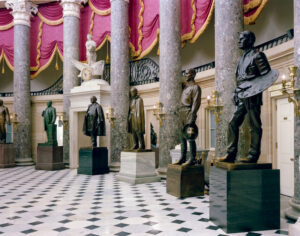
Manafort Faces Trial
In March, Election Central brought you a look at the arrest of Paul Manafort, Trump’s former campaign chairman, on a wide range of charges (18 counts in all) ranging from conspiracy to money laundering, to tax fraud. Now, btw takes a look at new developments as this case finally comes before a jury.
Manafort’s tax and bank fraud trial is currently going on at the federal courthouse in Alexandria, Virginia. A verdict could come as early as this week. No matter what the jury decides, this is still just the beginning of a long legal road for Manafort. If he is found guilty, he could possibly be sent to jail for the rest of his life. After that, he could appeal–or wait to see if Trump issues an extremely controversial pardon. If he is found innocent and is acquitted, he will still have to return to face another federal trial in Washington, D.C. in mid-September, this one for money laundering and foreign lobbying. And there’s always the possibility that new charges can be found and brought against him at any time.
Some experts think that Manafort may deliberately plead guilty at his September trial in order to avoid further public humiliation. Others, however, insist that Manafort will maintain his plea of innocence to the end. And there’s one other exciting possibility: that Manafort, found guilty, could then flip and help out the Mueller investigation against Trump, in exchange for receiving a lighter sentence. Regardless of how this first trial comes out, there will likely be much more news about Manafort to come.
Dig Deeper Visit this PBS News Hour Web site and create a list of all 32 charges against Paul Manafort. Based on this list, how do you think Manafort should plead?
Women, Remembered
Think about the town in which you live. Does it have statues memorializing famous, influential people in history? If so, how many of them can you name?
Here’s a harder question: Can you name any historic statues in your town that are of women?

Credit: Photographs in the Carol M. Highsmith Archive, Library of Congress, Prints and Photographs Division.
Chances are, you can’t. And that’s because, out of all of the thousands of statues all across the country memorializing our nation’s history, very few of them are of women. In fact, out of the roughly 5,200 memorial statues that exist across the U.S., it is estimated that fewer than 400 of them depict women. In Washington, D.C., which is full of monuments, only five public statues are of women. And in New York City, there are roughly 145 monuments of men but only five of these honor women.
So why does this matter? Because we build statues to recognize important contributions to our country. If we refuse to build physical memorials of women, we are not recognizing their contributions.
Luckily, there are many groups who are already trying to do something about this. In New York City, statues of suffragists Elizabeth Cady Stanton and Susan B. Anthony will soon appear in Central Park. In Richmond, Virginia, a monument is being built called “Voices from the Garden” that recognizes hundreds of important women who played a role in the history of Virginia and the United States. And similar efforts are taking shape in several other cities as well.
Dig Deeper Imagine that you are in charge of commissioning a statue of a famous woman from your community’s history. Who would you choose, and why? Use internet resources to learn more about this important woman, and then write a short paragraph describing what you find.
Losing “InfoWars”
Have you ever heard of “InfoWars”? Founded in 1999 by Alex Jones, it is a far-right “news” Web site that promotes conspiracy theories and intolerant points of view. InfoWars has created controversy ever since its inception, and as of last Sunday, it has now been banned by Facebook. The social media site has “unpublished” any pages belonging to Alex Jones or InfoWars.
Here’s why. According Facebook’s own policies, it’s okay for misinformation to remain on the popular social media site. But Facebook doesn’t allow the publication of hate speech. So when InfoWars took verbal aim at groups such as Muslims and transgendered people, it was a clear violation of Facebook’s anti-hate speech rules. Jones and his platform likely would have been banned years ago, except that because of his huge number of followers, Facebook and its CEO, Mark Zuckerberg, were concerned about the backlash that would result.
So far, the backlash has been pretty minimal. YouTube, Pinterest, and other social media platforms followed suit and banned Jones and InfoWars as well. (Notably, Twitter did not follow this path.) Jones himself responded with a marketing campaign saying that his free speech rights had been violated and that he was the victim of censorship. Facebook has reassured its followers that it believes in free speech, but will not support hate speech.
However, there are those experts, even on the left, who have voiced concerns about the right of a social media giant to include some viewpoints while excluding others. They wonder if one single media executive should have the right to shut off a news organization from a large portion of its audience, simply because he or she doesn’t agree with the viewpoints expressed. But either way, for the time being at least, Jones will have to find new ways to get his controversial message out.
What Do You Think? In your opinion, should Facebook have banned Alex Jones and InfoWars? Why or why not? Please remember to be respectful with your answers.
Changes Ahead for the Oscars
Do you pay attention to the Academy Awards (otherwise known as the Oscars) each year? If you skip it, you’re not alone. The number of people watching the awards show has plummeted drastically in recent years, leading the Academy of Motion Picture Arts and Sciences to institute some changes that it hopes will help the show to regain some of its lost popularity.
The first, and probably most notable, change is that the show will now be shorter. Last year’s show ran four hours and it has been notoriously long for many years before that. The Academy has pledged to cut the televised ceremony down to three hours this coming year. They plan to accomplish this by giving out some of the awards during commercial breaks (currently, 25 awards are presented on the air). Though it hasn’t yet publicized which awards will get nudged to an off-air slot, insiders indicate that it’s likely to be the awards for short films.
Secondly, as of 2020, the Oscars will occur earlier in the calendar year. Therefore, while the next ceremony will take place on February 24, 2019, the 2020 Oscars will be held on February 9. The Academy hopes that this will increase excitement over the awards.
Finally, and most controversially, the Academy is adding a new award category: “Outstanding Achievement in Popular Film.” This change results from the frustration many people have with the Academy for awarding “Best Picture” to films few people have heard of or seen (such as last year’s “The Shape of Water”) while ignoring widely popular films (“Black Panther,” for example). But critics are quick to point out that the concept of “popular” is largely subjective, and that the new category could wind up doing more harm than good
